Your Oven Is Making Noises
Is your oven humming, buzzing, whirring or rattling, or making it sound as if you've started a cultivator up in your kitchen? No need to be alarmed. There are a number of reasons why a cooker might make unusual sounds. Let's take a look at these one by one so you can work out where this problem is coming from.
THE POTENTIAL CAUSES FOR THIS ISSUE:
-
The convection fan impeller has come loose
-
The convection fan mechanism is faulty
-
The cooling fan is faulty
-
The mechanical timer is broken
-
One or more metal body panels has come loose
-
The door safety lock and main circuit board are faulty
WARNING
Before you do anything to your appliance, make sure you disconnect it from the power supply.
There is a risk of electric shock.
Wear suitable protective gloves if you need to dismantle anything.
There is a risk of getting cut or injured.
The convection fan impeller has come loose
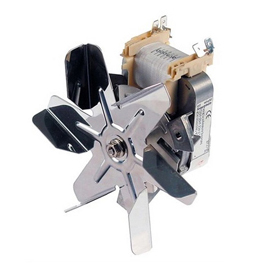 The impeller is the actual fan part (the rotary blades) of the convection fan mechanism. As it rotates, it absorbs the air heated by the various elements in your oven through its centre. This produces even, consistent cooking throughout the oven cavity. The impeller is held in place by a screw/bolt at its centre. Over time, this can work loose. When this happens, the result is a loud vibrating noise. The impeller is accessible behind the back wall of your oven's interior. It is held in place by several bolts. All you need to do is ensure the nuts are properly tightened.
The impeller is the actual fan part (the rotary blades) of the convection fan mechanism. As it rotates, it absorbs the air heated by the various elements in your oven through its centre. This produces even, consistent cooking throughout the oven cavity. The impeller is held in place by a screw/bolt at its centre. Over time, this can work loose. When this happens, the result is a loud vibrating noise. The impeller is accessible behind the back wall of your oven's interior. It is held in place by several bolts. All you need to do is ensure the nuts are properly tightened.
The convection fan mechanism is faulty
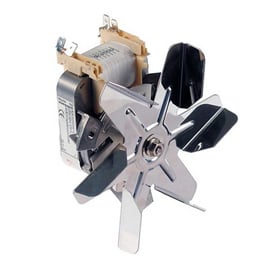 The purpose of the convection fan is to circulate the heat generated by your oven's heating elements. If the fan's bearings or spindle are worn or damaged, this could make your oven produce a considerable amount of noise. To check whether the convection fan is the cause of your issue, first disconnect the oven from the electricity. Then disconnect the fan's connectors, taking care to insulate them with electrical tape. Next, turn the oven on and listen. If it's no longer making noise, and you've already tightened the bolts on the impeller, the convection fan will need to be replaced.
The purpose of the convection fan is to circulate the heat generated by your oven's heating elements. If the fan's bearings or spindle are worn or damaged, this could make your oven produce a considerable amount of noise. To check whether the convection fan is the cause of your issue, first disconnect the oven from the electricity. Then disconnect the fan's connectors, taking care to insulate them with electrical tape. Next, turn the oven on and listen. If it's no longer making noise, and you've already tightened the bolts on the impeller, the convection fan will need to be replaced.
Purchase an oven convection fan
The cooling fan is faulty
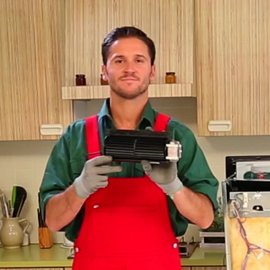 The cooling fan will normally be located somewhere at the top of your oven's interior. These fans can sometimes end up becoming very noisy. To resolve this issue, try applying some grease to your cooling fan's spindle. If it's still very noisy after you've done this, you will need to replace it.
The cooling fan will normally be located somewhere at the top of your oven's interior. These fans can sometimes end up becoming very noisy. To resolve this issue, try applying some grease to your cooling fan's spindle. If it's still very noisy after you've done this, you will need to replace it.
The mechanical timer is broken
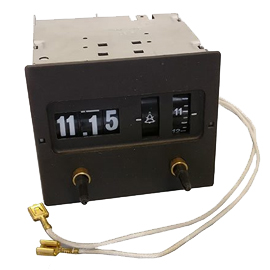 Some cookers are equipped with a mechanical timer. These contain a small motor and various cogs. As they become worn with use, and due the heat and fat from the oven, they can end up making little whirring and chirping type sounds in fits and starts. If this is the case with yours, you will need to replace it: cleaning and lubricating the mechanism will not be enough to fix the issue over the long term.
Some cookers are equipped with a mechanical timer. These contain a small motor and various cogs. As they become worn with use, and due the heat and fat from the oven, they can end up making little whirring and chirping type sounds in fits and starts. If this is the case with yours, you will need to replace it: cleaning and lubricating the mechanism will not be enough to fix the issue over the long term.
Purchase an oven mechanical timer
One or more metal body panels has come loose
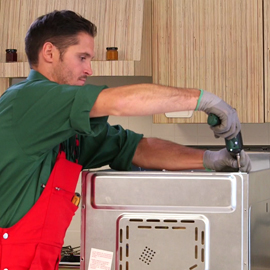 Your oven's body and interior are made up of a variety of metal panels. They will be fixed in place with a number of screws/bolts. Sometimes, these panels can end up working loose due to the vibration produced by the oven, which may cause them to become noisy. To prevent this, simply make sure all the screws/bolts are properly tightened. We recommend applying a thin strip of rubber tape between the edges of the external panels before tightening them up. However, do not apply rubber tape or any other flammable material to any parts of the oven that get too hot when it's in use.
Your oven's body and interior are made up of a variety of metal panels. They will be fixed in place with a number of screws/bolts. Sometimes, these panels can end up working loose due to the vibration produced by the oven, which may cause them to become noisy. To prevent this, simply make sure all the screws/bolts are properly tightened. We recommend applying a thin strip of rubber tape between the edges of the external panels before tightening them up. However, do not apply rubber tape or any other flammable material to any parts of the oven that get too hot when it's in use.
The door safety lock and main circuit board are faulty
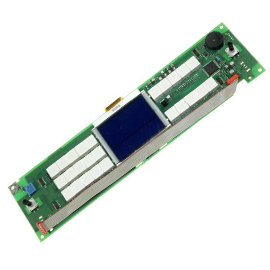 The door safety lock keeps the oven door securely closed during pyrolysis (self-cleaning). Some door safety locks are fitted with a small coil. If the door lock or the circuit board (PCB) is faulty, this may cause the coil to produce very strong vibrations. In which case, it will need to replaced.
The door safety lock keeps the oven door securely closed during pyrolysis (self-cleaning). Some door safety locks are fitted with a small coil. If the door lock or the circuit board (PCB) is faulty, this may cause the coil to produce very strong vibrations. In which case, it will need to replaced.
